Joy Neal Kidney's Blog, page 91
March 11, 2020
Favorite Books Challenge
Last year I was challenged to post covers of favorite books, one a day for seven days without comment.
No surprise that they are all nonfiction. When did I become such a history fan?
[image error]
[image error]
[image error]
[image error]
[image error]
[image error]
[image error]
March 8, 2020
Danny Wilson: MIA
The target for the February 19, 1945, for the 14th Fighter Group was Vienna, but the bombers the two dozen fighters were escorting decided to attack the alternate target of Bruk, southwest of Vienna. A dozen of them, including Dan Wilson, have an additional mission near Graz—providing cover for an experimental skip bombing. This is similar to the skip bombing over water Dale did in New Guinea except that this done against a sixteen-car train.
After a strafing run, Number 4 of the flight dropped back to take photos of the damage. When he pulled up over the train, the left engine was smoking. When he didn’t return to his formation, two P-38s returned to the area but find no trace of Danny’s plane.
His plane had hit a pole and crashed about two kilometers south of the railroad station at Schwanberg, Austria, in a forest along Sulm Creek in the snowy forested foothills of the Alps. According to his casualty records, the dead American “Flying Lieutenant” found in the wreck was identified by his tags as Daniel S. Wilson. Wehrmacht soldiers kept the tags but turn the body over to village officials.
The next day, a grave was dug at the edge of the Schwanberg cemetery. Daniel S. Wilson was buried in a pine box provided by the village. A service was held secretly by the local Roman Catholic priest. Attending were the bergermeister, the chief of police, and the grave digger.
Someone made a wooden cross for the new grave–in the uppermost lines, entrance on the left side–marked “Daniel S. Wilson 19.2.1945.”
At Schwanberg his death certificate, in German, was registered. And at his base at Foggia, a Missing Aircraft Report (MACR) was filled out for P-38 L1LO #44-24123, which carried weapons manufactured by Colt, Frigidaire, and International Harvester—companies that had retooled for war.
Two days later at their headquarters in Graz, the Wehrmacht reported the death of a member of an enemy air force, recording the place, date, serial number, name, and that two ID tags had been found on the American flyer.
[image error]
This information would be how Dan Wilson’s remains would be located over a year later. They wouldn’t learn the details of his loss and burial for four more decades.
At Triolo field, Lt. Richard Tomlinson had typed up a report on the loss of the plane. His belongings were inventoried by a squadron Personal Effects Officer.
[image error]Pilots Dan Wilson and Richard Tomlinson
And the Flight surgeon filled out another form on Dan, adding, “Good man—good pilot.”
WASHINGTON DC VIA MINBURN IOWA CLABE D WILSON MAR 10 THE SECRETARY OF WAR DESIRES ME TO EXPRESS HIS DEEP REGRET THAT YOUR SON SECOND LIEUTENANT DANIEL S WILSON HAS BEEN REPORTED MISSING IN ACTION SINCE NINETEENTH FEBRUARY OVER AUSTRIA IF FURTHER DETAILS OR OTHER INFORMATION ARE RECEIVED YOU WILL BE PROMPTLY NOTIFIED J A ULIO THE ADJUTANT GENERAL
Writing them the same day, Major General Twining, Commanding General of the Fifteenth Air Force, wrote,
“My dear Mrs. Wilson:
“I am certain that the news that your son, Second Lieutenant Daniel S. Wilson, is missing in action must have been a great shock to you, and that you have been eagerly awaiting further data. Although I can give you no definite information as to Daniel’s fate, the following facts may be of some help.
“On February 19, 1945, your son took his P-38 on a mission to escort a formation of bombers to Bruck, Austria. After reaching the target, the fighter escort set out to destroy enemy communications in the vicinity of Graz, Austria. When the flight reassembled after attacking a train, Daniel was missing. Two planes returned to the area but could find no trace of your son or his ship. Should there be a change in his status at any time in the future, you will be notified immediately by the War Department.
“Daniel’s personal possessions have been carefully packed for shipment to the Effects Quartermaster, Army Effects Bureau, Kansas City, Missouri, who will forward them to the designated beneficiary.
“For the courageous manner in which he carried out his hazardous duties during the course of frequent combat operations, your son has been awarded the Air Medal with Oak Leaf Cluster. I share your pride in his achievements and your hopes for his safe return.”
[image error]
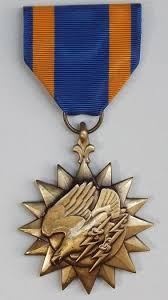
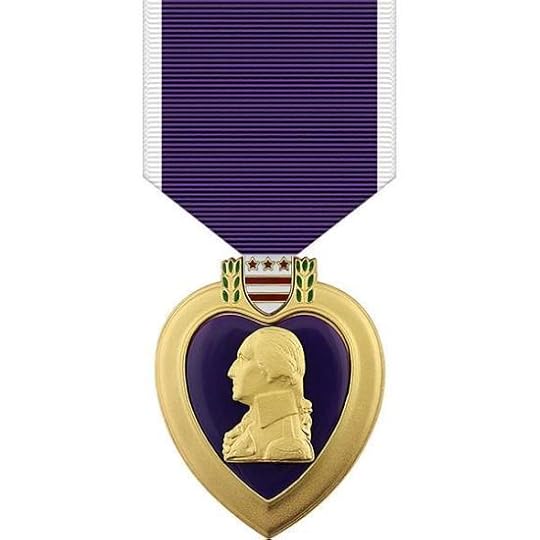
March 6, 2020
Breakfast with Wilson Brothers at Washington Township School
The Perry News, February 22, 2020

Joy Neal Kidney, left, author of “Leora’s Letters,” was joined by Harry “Junior” Brewer of Adel, seated right, at Saturday’s Washington Township Consolidated Schhol fundraising breakfast.

Monuments to Dale, Daniel and Claiborne “Junior” Wilson stand in Violet Hill Cemetery in Perry.

Joy Neal Kidney, standing left, spoke about her uncles, the five Wilson brothers depicted on the Dallas County Freedom Rock, at the Oct. 19, 2019, dedication in Minburn.
Saturday’s fundraising breakfast at the Washington Township Consolidated School, originally scheduled for Saturday, Jan. 18 but cancelled for bad weather, must have caused some pent up demand because by 7:15 a.m. there was a long line of folks hungry for pancakes and eggs, biscuits and gravy, hash browns and sausage.
The crowd was also turning out in support of local favorite Joy Neal Kidney, author of the recently published “Leora’s Letters: The Story of Love and Loss for an Iowa Family in World War II,” which recounts the history of the five Wilson brothers from Minburn who served in World War II and the three who never returned.
Neal Kidney, who was recovering from shoulder surgery, signed books and chatted with local supporters in the lunchroom of the old school. She donated all sales of her book to the Washington Township Consolidated School Preservation Committee.
Harry “Junior” Brewer of Adel told Neal Kidney that he used to ride the schoolbus with two of her uncles, Danny Wilson and Junior Wilson. Daniel S. Wilson, later a second lieutenant in the U.S. Air Force at 21, was killed in action in Austria in February 1945 while flying a P-38 [fighter plane]. Claiborne Junior Wilson, 20, was a flight officer in the U.S. [Army] Air Force when he was killed in formation training in Texas in 1945 while flying in [formation in a] P-40 Warhawk.
The third Wilson brother to die in service to America was Dale R. Wilson, a 22-year-old second lieutenant in the U.S. Air Force declared missing in action Nov. 27, 1943, near Wewak, Papua New Guinea.
Neal Kidney’s mother, Doris Wilson Neal, was a sister to the fallen airmen. The two eldest Wilson brothers, Delbert and Donald, joined the U.S. Navy and survived the war. Doris Wilson’s younger sister, Darlene, was Dale’s twin.
The image of the five Wilson brothers was dedicated on the Dallas County Freedom Rock in an Oct. 19, 2019, ceremony.
 The Wilson family in November 1941 in Perry, seated from left, Claiborne “Clabe” Wilson and Leora Wilson; standing from left, Daniel Wilson, Darlene Wilson Scar, Donald Wilson, Claiborne Junior Wilson, Delbert Wilson, Doris Wilson and Dale Wilson. Photo courtesy Joy Neal Kidney
The Wilson family in November 1941 in Perry, seated from left, Claiborne “Clabe” Wilson and Leora Wilson; standing from left, Daniel Wilson, Darlene Wilson Scar, Donald Wilson, Claiborne Junior Wilson, Delbert Wilson, Doris Wilson and Dale Wilson. Photo courtesy Joy Neal KidneyMarch 4, 2020
Lightning Sky
The Book
[image error]
A U.S. fighter pilot captured by the enemy. A father determined to rescue his son. One of the most remarkable and moving true stories of faith and perseverance to come out of World War II.
October 6, 1944. Twenty-year-old Army Air Corps Second Lieutenant David “Mac” Warren MacArthur was on a strafing mission over Greece when a round of 88-mm German anti-aircraft flak turned his P-38 Lightning into a comet of fire and smoke. Dave parachuted to safety as the Lightning lived up to her name and struck the Adriatic Sea like a bolt of flames. In minutes, he was plucked from the water—only to find himself on the wrong end of a German rifle pointing straight at his head.
Dave’s father, Lieutenant Colonel Vaughn MacArthur, was a chaplain with the 8th Armored Division of Patton’s Third Army when he learned of his son’s capture. He made it his personal mission to find him. For the duration of the war, as Dave was shuttled from camp to camp—including Dachau—his father never stopped searching. Then in May 1945, Vaughn’s last hope was Stalag VII-A in Moosburg, Germany. Through the barbed wire fence, he cried out his son’s name. Incredibly, out of tens of thousands of POWs, one of them, squinting into the sunlight, turned and smiled.
Father and son spent the next two weeks together celebrating, a forever cherished memory. Over the next twenty-five years, Dave would go on to honor his father on rescue missions of his own, becoming a highly decorated and genuine American war hero. In both Korea and Vietnam, Dave would carry with him the legacy of a great man who gave everything to save his son.
An inspiring, harrowing, and unforgettable chronicle of love of family and love of country, Lightning Sky is a timeless testament to extraordinary lives in extraordinary times.
The Author
I couldn’t find information about R. C. George, although his website does contain photos of the MacArthur family.
My Thoughts
I bought “Lightning Sky” because of the P-38 on the cover, although there is precious little about combat in one. In fact, Dave MacArthur didn’t even fly one until he arrived in Italy for combat, which is where my uncle, Daniel S. Wilson, was based 75 years ago. They served in the same 14th Fighter Group, based at the Foggia Airfield Complex near San Severo, but in different squadrons–at about the same time.
The book opens and closes with MacArthur’s military service in Korea (also Vietnam), but the bulk of the story is about his experiences as a POW of the Germans during the waning months of the European war. The most fascinating part was that his father, Vaughn MacArthur, served as a frontline Army Chaplain with the 8th Armored Division at the same time, and kept searching for where his son was being kept. They were eventually reunited, right before VE-Day.
Dave MacArthur had just been returned to the States that June when a telegram arrived about his father’s loss. Vaughn MacArthur is buried at Lorraine American Cemetery, St. Avold, France, which is where my uncle, P-38 pilot Daniel Wilson, is also buried–along with over 10,000 other young Americans.
There are extensive Endnotes in the book, but not one photograph except for the one on the cover. A fascinating chapter in WWII history.
March 2, 2020
Leora Goff and the Guthrie County Jail
From Leora (Goff) Wilson’s memoirs:
When we lived in Guthrie Center, the year of 1900, one of our neighbor girls, who was a little older than I, told us about two men who were in the jail. They had been in the penitentiary previously and had learned some art. The neighbor girl must have heard some grownups talking about it.
[image error]
We were curious, so one Sunday afternoon, she (Gertrude Moty) and Dot Ferry, my brother Merl, and I (8, 9, and 10-year-olds) went to the jail and, Gertrude being the oldest, did the talking to these men. They told us to get them some pasteboard boxes and glue and they would make us something.
[image error]Leora, right before they moved into Guthrie Center for a year.
So on Monday we went to a store and got the material and took it to the jail. The men put a broom through the bars for us to put the material on. They put the broom out several times, as we had material for each of us. There was a space between the outside windows and the jail cell. The prisoners told us when they would be ready–it was several days, as I remember. They made one girl a doll cradle, one a church, Merl a merry-go-round with cut-out animals riding, and mine was a schoolhouse, just like the one we attended.
[image error]The old Guthrie County Jail
When we told our mother about what and where we had been, she told us we should never, never go near a jail. I had a feeling we shouldn’t all along, but the excitement of getting those articles made was worth the risk, we thought.
[image error]Guthrie County Courthouse, Guthrie Center, Iowa
When we found out our “art” was ready, Mother told us to go to the courthouse and ask about getting the things from the jail, so we saw the deputy sheriff. Our parents knew him and just Merl and I went with the deputy over to the jail. He told Merl he would have to carry out some ashes first before getting his prize, so Merl did carry some ashes out to dump outside.
I remember the deputy just unlocking the door wide enough for the men to put the little schoolhouse out–it was about 10″ X 12″–and Men’s merry-go-round. We thanked them and headed for home, relieved and so happy with our prizes. We never bothered a jail again. We kept the items for a long time, and I guess they just got lost in moving, then forgotten. I see Dot Ferry often–she and I are good friends still. (1973)
February 28, 2020
Eddie Rickenbacker–America’s World War I Ace of Aces–Landed at Dexter, Iowa
Date of the clipping is unknown, but Eddie Rickenbacker‘s landing east of Dexter was because of engine trouble happened in 1929.
[image error]
[image error]
February 26, 2020
P-38 Lightning by Jeffrey L. Ethell
The Book
Well detailed, large fold-outs by the Illustrator, Rikyu Watanabe, and brief but interesting text by Jeffrey Ethell about the P-38 Lightning.
The Author
Jeffrey Ethell (1947–1997), who learned to fly before he could drive a car, was an American aviation author and pilot who wrote extensively on aviation and military matters. He held both commercial pilot and flight instructor certificates.
Ethell was killed when the restored P-38 Lightning he was flying crashed at Tillamook, Oregon, while preparing for an airshow to honor his father, Ervin, who reported 10,000 hours of flight experience, of which approximately 3,000 hours of flight experience was in the P-38–15th Air Force, 14th Fighter Group, 48th Fighter Squadron, North Africa.
Jeffrey Ethell published a series of technical studies of WWII-era aircraft and authored 60 books and over 1,000 magazine articles. He logged over 4,800 hours in more than 210 different types of aircraft, including most of the World War II warbirds.
While still in college in Tennessee in the 1960s, Ethell was awarded research grants from the National Air & Space Museum, Smithsonian Institution. He was a popular guest lecturer. He was featured in the PBS Nova documentary about the military aircraft of the former Soviet Union, and was an expert commentator on many documentaries.
The Illustrator
Rikyu Watanabe, dean of aircraft illustrators, was born in 1927 in Osaka, Japan. In 1943 he volunteered for the Japanese Army Flight Cadet School. When the war ended in 1945, he was at an army air force base in China. Returning to Japan, he studied painting, graduating from Bunka Gakuin University in 1950. One of the world’s leading illustrators, since 1966 he has specialized in aircraft illustration, producing some of the finest aircraft illustrations every made.
My Thoughts
The West Des Moines library used to have a copy of this handsome book, but the last time–years ago–when I wanted to check it out again, it was missing. I figured someone added it to their own library.
I was thankful when you started finding places to buy used books on the Internet, and I eventually was able to score a copy of this book.
It includes the history of the design of the aircraft by Lockheed, wonderful diagrams and photos, plus foldouts of several known P-38s plus diagrams.
[image error]
I especially wanted it because it features a large foldout of a P-38L, which was the model of plane Danny Wilson flew and was lost in, February 19, 1945, Schwanberg, Austria.
[image error]
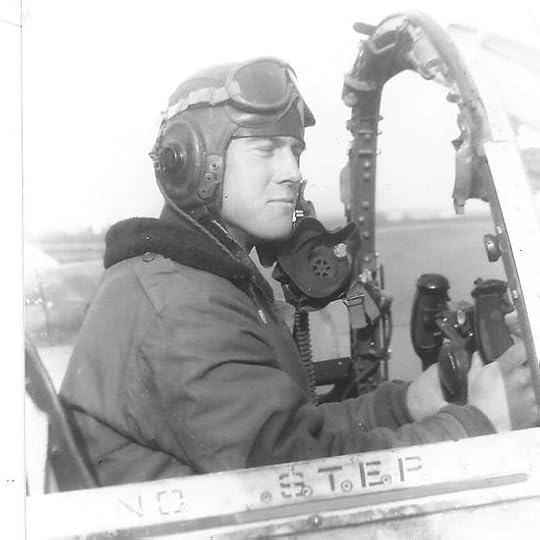

February 21, 2020
Leora Wilson–Role Model
I was about thirteen years old and didn’t want to go to the Black Hills with my parents and younger sister, even though we’d never taken a family vacation before.
“What’s at the Black Hills?” I was more interested in rolled up denim jeans and bobby socks.
“Mount Rushmore.” Mom always wore a housedress and work shoes with anklets. “And take your swimsuit in case we stop at Hot Springs for a swim.”
I knew I’d be stuck in the back seat of our two-toned blue Chevy with my annoying kid sister Gloria all the way through South Dakota. “Can’t we do something closer?”
“Maybe we could invite Grandma Wilson,” Mom mused.
“Could we? She loves going places!”
So Grandma Wilson saved the trip to the Black Hills. Just having her along made a big difference in my attitude. Well, in all of us. Grandma sat in the back between Gloria and me, so there wasn’t even any sisterly bickering.
[image error]Back in the day when you could double expose a photo–August 1958. Our family and Gavin’s Point Dam, Yankton, SD. I had no idea we were close to Bloomfield, NE, where Grandma Leora encountered Santee Sioux when she was a preschooler and her family tried to make a go of living in NW Nebraska.
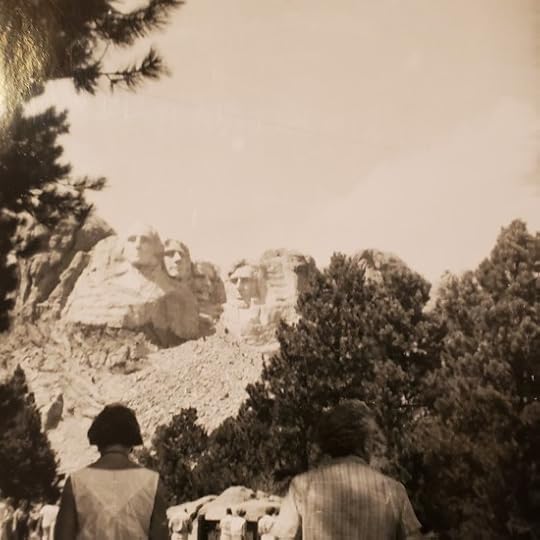
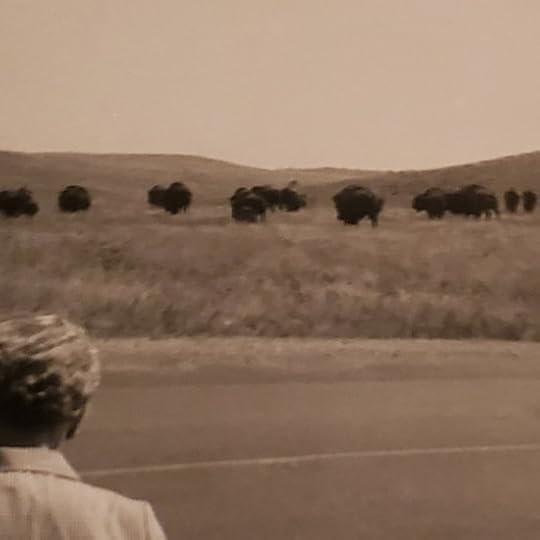
Grandma always wore a dress in those days, carried a handbag, and probably wore a hairnet over her permed hairdo (which she said she got at the “B-parlor”).
But for decades I took Grandma for granted although I enjoyed being around this upbeat little woman. She somehow made things fun by being her positive self.
Grandma wrote me newsy letters–in college, when I moved away from Iowa with my new husband, even to him in Vietnam. This jaunty little woman lived in a small house in Guthrie Center, Iowa, where she saved every trinket, every birthday card, every souvenir, and every letter.
[image error]505 N. Fourth Street, Guthrie Center, Iowa
My husband was so surprised to learn that this tiny white-haired woman had lost three sons during World War II, and was widowed not long after.
After she died, at age 97, I read the hundreds of family and letters and clippings she’d saved–from the early 1900s and through the war. Her letters were full of how many eggs she’d gathered and sold, how many jars of produce she’d canned for winter, news of rest of the family.
Then in my middle forties, I was stunned at the heartache she’d been through. All through my childhood and since I’d gone to the cemetery with her and her two daughters to help decorate family graves for Memorial Day, but didn’t realize that two of her sons aren’t even buried there. One is buried overseas. One was never found.
[image error]Rose and Don Wilson, visiting from Washington State, in his mother’s little kitchen in Guthrie Center.
Leora’s Depression Era years were also poignant–losing three infants, two of them to whooping cough when all nine children were quarantined with it. Her husband was out of work. But because of two sons who joined the Navy during those bleak years, even then her letters revealed an encouraging mother–in spite of having to accept hand-me-downs for her children and reinforcing the thin soles of her own shoes with cardboard.
After the losses of WWII and her husband not long after, Leora made a home for fourteen years for her own widowed mother. She never learned to drive so she walked to church and other activities, which were what her chatty letters were full of, plus how her garden was doing. She sewed and patched at the local hospital for decades, the one woman who could still run the old treadle machine.
[image error]Leora Wilson writing in her diary. Photo taken by Delbert Wilson, her oldest son.
When Gloria and I were still in school, Grandma would stay with us on the farm to attend our concerts and recitals. I don’t ever remember hearing this little lady complain about anything.
For half my life, Leora was my cheerful and supportive Grandma. For the latest half, she’s been a wonderful role model of winsome faith and endurance–through those old letters and my winsome memories of her.
February 19, 2020
Danny Wilson, Missing in Action
The 14th Fighter Group had three photo reconnaissance missions February 1, two to Munich, Germany, and one to Prague, Czechoslovakia. Danny’s thirteenth mission was most likely one to Munich because of a comment in his next letter home.
He said that they’d probably heard about our long-range bombers over Germany targets from these bases in Italy. And that the Russians had already taken quite a chunk out of Germany.
[image error]
He’d heard the news that the Americans were in Manila and had freed several thousand men from a concentration camp there. He figured that Dale had just as good a chance of being one of the men from that camp as another. News of those being freed bolstered his hopes, and knew his folks felt the same way.
Fifty-six Lightnings, including Danny’s, took off from Triolo field February 7 to escort Liberator bombers of the 304th Wing through the target, which again was Vienna oil refineries. In the target area they couldn’t find the Wing they were assigned to, so they escorted bombers from another. The formations were over the target for thirty minutes, with the inevitable flak. One of the bombers caught fire. Two others were hit by flak over Bratisava, Czechoslovakia. No chutes were seen. All the P-38s landed safely in Italy.
Two days later, Danny was one of ten who escorted two British Halifaxes to a supply dumping area at Crayon, Yugoslavia.
[image error]
And the USS Hancock sailed from Ulithi February 10 with Spruance’s Fifth Fleet, headed this time to Japan.
Danny’s combat mission February 14 was to escort B-24s on an attack of the Vienna Florisdorf Oil Refinery. There were two dozen other P-38s on the mission. Ten of them couldn’t fine the bombers they were assigned to, so they located Fortresses of the 5th Wing and escorted them instead. All of the fighters landed at their base safely.
Two days later, forty fighters escorted B-24 bombers to Dingolfing, Germany. Danny was one who after the bombing, “descended to the deck” to strafe in the Regensburg area, where they ran into bursts of flak. It. Wilson was credited with damaging a flak tower there. They also damaged or destroyed twenty-nine locomotives and several freight cars. One plane crashed after an engine caught fire. the pilot was warned to bail out. At 5000 feet the canopy came off. At 4000 feet the plane was over on its back. No parachute was seen.
Danny’s eighteenth mission was on the eighteenth, with forty-five other fighters. They were to escort the 55th Wing to Linz, Austria, but a heavy overcast caused them to turn back over Yugoslavia.
Daniel Wilson, Missing in Action
The target for the February 19 for the 14th Fighter Group was Vienna, but the bombers the two dozen fighters were escorting decided to attack the alternate target of Bruk, southwest of Vienna. A dozen of them, including Dan Wilson, have an additional mission near Graz—providing cover for an experimental skip bombing. This is similar to the skip bombing over water Dale did in New Guinea except that this done against a sixteen-car train.
After a strafing run, Number 4 of the flight dropped back to take photos of the damage. When he pulled up over the train, the left engine was smoking. When he didn’t return to his formation, two P-38s returned to the area but find no trace of Danny’s plane.
His plane had hit a pole and crashed about two kilometers south of the railroad station at Schwanberg, Austria, in a forest along Sulm Creek in the snowy forested foothills of the Alps. According to his casualty records, the dead American “Flying Lieutenant” found in the wreck was identified by his tags as Daniel S. Wilson. Wehrmacht soldiers kept the tags but turn the body over to village officials.
The next day, a grave was dug at the edge of the Schwanberg cemetery. Daniel S. Wilson was buried in a pine box provided by the village. A service was held secretly by the local Roman Catholic priest. Attending were the bergermeister, the chief of police, and the grave digger.
Someone made a wooden cross for the new grave–in the uppermost lines, entrance on the left side–marked “Daniel S. Wilson 19.2.1945.”
At Schwanberg his death certificate, in German, was registered. And at his base at Foggia, a Missing Aircraft report was filled out for P-38 L1LO #44-24123, which carried weapons manufactured by Colt, Frigidaire, and International Harvester—companies that had retooled for war.
Two days later at their headquarters in Graz, the Wehrmacht reported the death of a member of an enemy air force, recording the place, date, serial number, name, and that two ID tags had been found on the American flyer.
This information would be how Dan Wilson’s remains would be located over a year later. They wouldn’t learn the details of his loss and burial for four more decades.
At Triolo field, Lt. Richard Tomlinson had typed up a report on the loss of the plane. His belongings were inventoried by a squadron Personal Effects Officer.
And the Flight surgeon filled out another form on Dan, adding, “Good man—good pilot.”
February 17, 2020
Danny Wilson: We Don’t Want Any Heroes
A fighter pilot, Danny Wilson was lost
in February 1945, when his silver Lightning
dropped back to take photos
on a mission over Austria.
[image error]
Danny’s last furlough home to Dallas County, Iowa,
was the spring of 1944. His picture, taken in Perry,
shows his solid jaw, broad shoulders. Confident, content.
Silver pilot’s wings against the dark uniform.
In a snowy forest in the foothills of the Alps, Wehrmacht
soldiers find a dead American flying lieutenant
in the wreckage of his forktailed devil.
Wilsons had also taken snapshots of Danny beside
the ’42 Plymouth with his sisters and holding his nephew.
Doris, her first baby due in six weeks, stood behind
Darlene and Danny so her “condition” wouldn’t show.
[image error]
The airman who lost his life at Schwanberg, Austria,
in February of 1945, was identified by his dogtags,
which the Wehrmacht kept–Daniel S. Wilson.
When Danny began cadet training, Doris wrote,
“I just want you to know, whether you turn out
to be an ace or a grease money,
you’ll still be a swell brother to me.
The 37th Fighter Squadron in Italy reported his P-38 lost,
his belongings were inventories, and the flight surgeon added
to a form about Danny’s loss, “good man–good pilot.”
And Doris wrote, when she learned he had gotten
his overseas orders, “Danny, you take darn good
care of you, and get back home as soon as possible.
We don’t want any heroes in the family, just all of us home.”
At Danny Wilson’s burial were four strangers: the village inspector,
the grave digger, the bergermeister, and the Roman Catholic priest,
who held a burial ceremony for him. . . secretly.
His parents received a telegram in March 1945 notifying them
that Danny was missing in action. But they never learned the details
of his death and burial. The daughter born to Doris was the first
family member to see, fifty years later, his casualty records.
That fall, after the war was over, Danny’s grave was located
by a British Graves Registration Team, though captured German records,
in the Schwanberg cemetery. His remains were removed
and taken to France for final burial.
But Danny Wilson’s parents received no other word about him
until January 1946, when the War Department finally reported
that it had received “evidence considered sufficient
to establish the fact of [his] death.”
In a carton sent home with his other belongings, Danny’s parents
found a small New Testament. On the page with the American flag,
Danny had written, “I give everything for the country it stands for.”
All five Wilson brothers served in the war–two in the Navy,
three in the Army Air Corps. At age 21, Danny was one
of the three young pilots who never came home.



